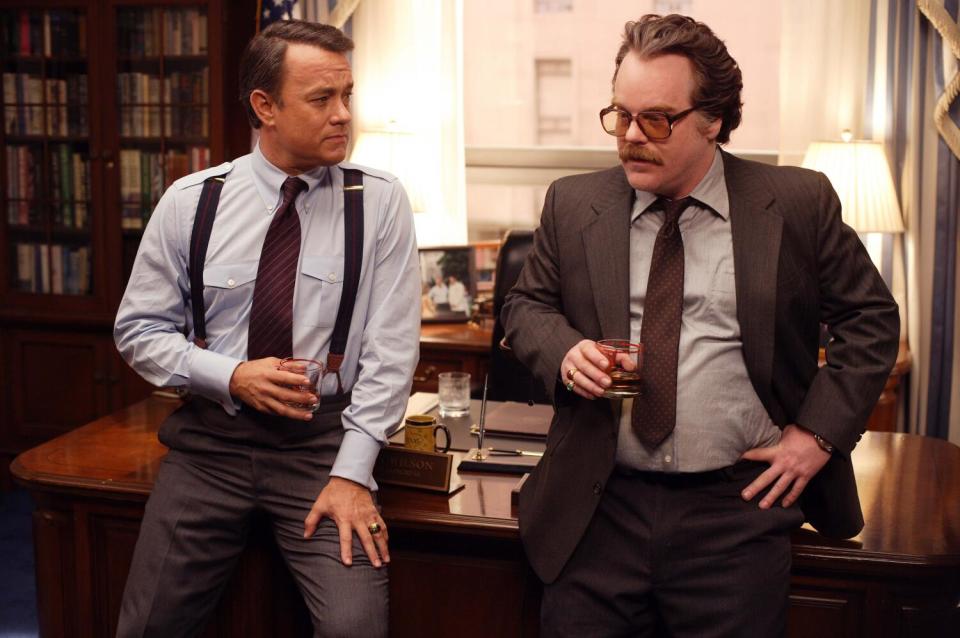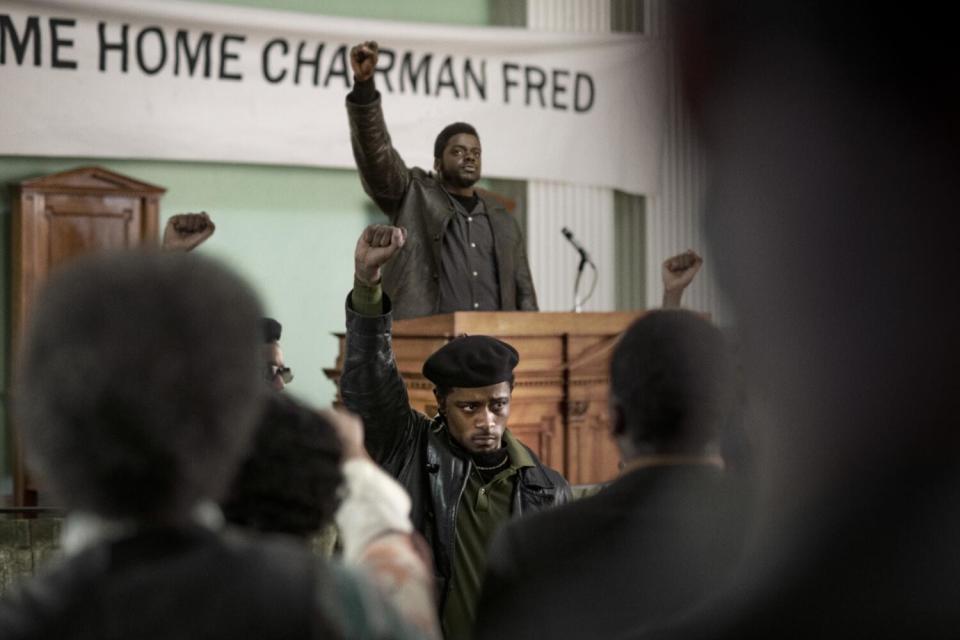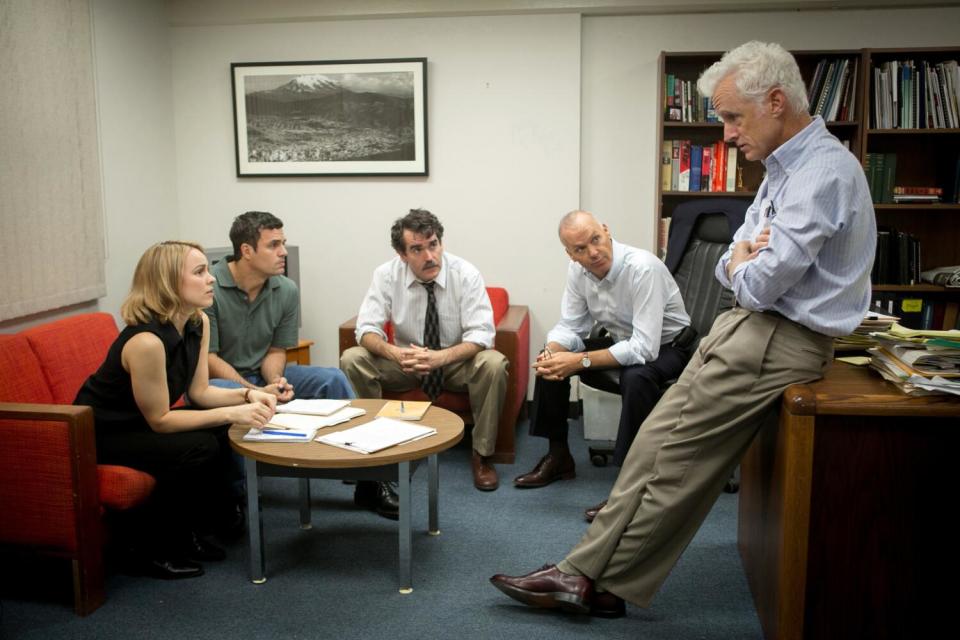The 12 greatest movies from the shuttering Participant Media
Founded in 2004, Participant Media, a production company known for its sociopolitical daring, burned an unusually bright arc across a filmscape that, more typically, reserved its fireworks for superheroes. When news broke in April that Participant would be closing up shop, a cry went out among all who value films of substance. They weren't all hits and they weren't all made by gifted filmmakers. But many of its movies remain extraordinary records of their moment. With Participant’s final release, “The Grab,” opening Friday, the reporters and editors of The Times chose our 12 favorites.
'Charlie Wilson’s War'

The last film by powerhouse director Mike Nichols, 2007’s “Charlie Wilson’s War” managed to be both a freewheeling behind-the-scenes comedy amid the halls of governmental power and also a sober consideration of the unintended consequences of American interventions across the globe. Tom Hanks stars as an affable, secure-in-his-seat Texas congressman who is uniquely able to engage in bipartisan wheeling and dealing. He finds himself unexpectedly situated to increase funding for a covert war against the Soviet Union in Afghanistan. Julia Roberts brings zest to her role as a conservative activist and socialite, but it is Philip Seymour Hoffman as a brash, acerbic veteran CIA officer who more or less walks off with the movie. From a screenplay by Aaron Sorkin, the film’s politics can be a bit fuzzy, but it is difficult to imagine a movie like this coming from any major studio today. (Streaming on Max) — Mark Olsen
'Contagion'
Nearly a decade before the COVID-19 pandemic, Steven Soderbergh’s disaster movie lodged itself firmly in my imagination — then real life decided to catch up. Juggling family saga, medical procedural and political thriller with aplomb, all against the backdrop of Cliff Martinez’s thrumming electronic score, “Contagion” canvasses enough terrain to capture the scale of the crisis it depicts without retreating into didacticism. To me, there is no more indelible heroine in contemporary cinema than Jennifer Ehle’s virologist, Ally Hextall, who quietly, determinedly, develops a humanity-preserving vaccine simply by applying the scientific method. And if the film’s hucksters, opportunists and desperadoes are no match in the long run for decency and good governance, I don’t think that’s because “Contagion” wants to play Pollyanna. It’s just proof that the times have changed enough since its release to make it feel like science fiction of another kind entirely. (Apple TV+, YouTube TV) — Matt Brennan
'David Byrne's American Utopia'
You remember the pandemic? Social distancing? Sanitizing groceries? Zoom birthday parties? Ugh. And here comes “David Byrne’s American Utopia,” the Spike Lee-directed film version of Byrne’s jubilant 2019 Broadway show, and it feels like a jolt to the prevailing same-as-it-ever-was monotony. It’s an invitation to connect, change and maybe even venture out of your house and ride a bicycle, as Byrne does through the streets of New York City during the closing credits. This movie was a lifesaver. It felt like we were on the road to nowhere, but here was an exit sign pointing toward hope and community, feet on the ground, head in the sky. (Max) — Glenn Whipp
'Descendant'
The story of the discovery of the Clotilda — the last known ship to bring enslaved Africans to America in 1860 and subsequently set on fire and sunk outside Mobile, Ala. — Margaret Brown’s 2022 documentary looks at the ways historical events have an ongoing influence on the present day. Taking in the accounts of descendants of those brought over on the Clotilda, the film unravels a story that is vibrantly complex and deeply moving. Brown, a white native of Mobile, takes great care in how and why she tells the story of the search for the ship and the aftermath of its discovery. "Descendant" is also instructional in how to acknowledge and move forward from one’s own blind spots of experience and perception. With its thoughtful, empathetic engagement with tricky subject matter, this is the sort of socially aware work that Participant excelled at creating. (Netflix) — Mark Olsen
'Flee'
The film's impressive list of accolades speaks for itself: The animated documentary was the first ever to be nominated for international feature, animated feature and documentary feature at the Academy Awards. "Flee" follows Amin Nawabi (a pseudonym) as he shares details about his past as an Afghani child refugee who fled his country with his family before being separated and eventually making his way to Denmark. Even as someone who watches their fair share of animation, I found my understanding of the possibilities of the medium being expanded. It’s a film that proves that “Animation is cinema” is more than just a buzzy rallying cry. (Hulu) — Tracy Brown
'An Inconvenient Truth'
It seems hard to fathom now amid the daily deluge of headlines about the ongoing climate catastrophe, but before Al Gore began trotting out the slide show that became “An Inconvenient Truth,” conversations about global warming were mostly limited to scientists and environmental activists, with the general public largely shrugging it off. Director Davis Guggenheim’s 2006 documentary changed all of that, shedding light on the disastrous consequences of climate change through the former vice president’s mix of scientific evidence and personal narrative. A critical and commercial success, “An Inconvenient Truth” went on to win two Oscars and spawn a 2017 sequel, cementing Participant’s reputation for producing socially relevant films that could sway public perception. (Paramount+, Kanopy, Pluto TV) — Josh Rottenberg
'Judas and the Black Messiah'

Has there been a more powerful pairing in movies this decade than Daniel Kaluuya and LaKeith Stanfield in “Judas and the Black Messiah”? I’d need convincing. Director Shaka King’s accomplished breakthrough stars Kaluuya as Illinois Black Panther Party leader and defiant activist Fred Hampton and Stanfield as William O’Neal, the FBI informant instrumental in Hampton’s killing. It’s a tense thriller and a blistering indictment of the American criminal justice system’s role in state-sanctioned violence. It’s galvanizing. It’s infuriating. And it’s still mind-blowing that it was distributed by a major Hollywood studio. Three years on, we’re still waiting for King’s follow-up to a movie that was nominated for six Oscars, including nods for best picture and Kaluuya and Stanfield. (Kaluuya won for supporting actor.) Someone needs to give this man the green light. (Max) — Glenn Whipp
'The Look of Silence'
Director Joshua Oppenheimer’s searing 2014 documentary — a companion piece to his earlier film "The Act of Killing" — follows a mild-mannered Indonesian optometrist as he bravely confronts the men who carried out the country’s brutal mass killings of alleged communists during the 1960s, a purge that claimed the life of his brother. Nominated for the documentary feature Oscar, the film is unflinching in its portrayal of horror, as the killers, who now rule the country, casually and even cheerfully describe butchering their victims. But it is equally devastating in its humanity, exposing the haunting legacy of trauma and the quest for justice in a society silenced by fear. It’s a tough film to watch yet impossible to look away from. (Available on multiple platforms) — Josh Rottenberg
'My Name Is Pauli Murray'
It’s hard to admit that I didn’t know about Pauli Murray until I saw “My Name Is Pauli Murray” at the 2021 Sundance Film Festival. A poet, lawyer, scholar and civil rights activist, Murray was ahead of their time in their legal approach to challenging segregation and discrimination, understanding intersectionality and gender. For me, the film was another reminder about how queer and trans history is most often lost — or goes untold. Murray struggled with their gender at a time when the language about being trans or nonbinary didn’t exist. The understanding of these identities may be new but queer, trans and gender-nonconforming people have always been here helping change the world. (Prime Video) — Tracy Brown
'No'
Chile's Pablo Larraín is one of the most playfully political filmmakers we've got: The psychodramas "Spencer" and "Jackie" are both his, as was last year's Pinochet-as-vampire comedy "El Conde." (Angelina Jolie's new Maria Callas biopic? Also a Larraín picture.) But it was Participant that, in no small way, put this director on the map with 2012's "No," a film that dared to ask: Can we simply vote a brutal dictator out of power? Chile's real-life referendum happened in 1988; Larraín casts a hilariously paranoid Gael García Bernal as the advertising executive tasked with selling removal to a cautious citizenry living in a climate of fear and consequences. Shot on intentionally cruddy-looking video to match the era's newscasts, "No" represents a filmmaker pursuing his political convictions to darkly comic ends. (VOD, multiple platforms) — Joshua Rothkopf
'Spotlight'

Participant won its share of Oscars and critics prizes, but this film would have to be its most audacious success: a pulse-quickening gamble that took on real-life sexual predation in the Catholic Church. Just as movingly (and not only to this writer), "Spotlight" burnishes the righteous power of the press, chasing down a story on fumes and making a difference in the newsroom and beyond. There's no weak link in the assembled cast, a group that includes Michael Keaton, Rachel McAdams, Mark Ruffalo, John Slattery and Liev Schreiber, all believable as pavement pounders for the Boston Globe. Comparing "Spotlight" to "All the President's Men," even flatteringly, was almost too-faint praise. It's a movie that, if experienced at the right age, can turn someone into a journalist. (Starz) — Joshua Rothkopf
'Syriana'
The list of American fiction films to confront the war on terror and our concomitant invasions of Afghanistan and Iraq is much longer on misfires than success stories — and of the latter, “Syriana” deserves credit for being one of the first past the post. Writer-director Stephen Gaghan’s ensemble drama is in many ways a time capsule from 2005, down to its sprawling cast of bold-faced names and the era's vogue for watching far-flung, seemingly disparate characters collide. What distinguishes "Syriana" from the empty fates-and-furies cynicism of a film like "Babel," however, is that its interest lay not in the crash but in the mechanism behind it. From the opening sequence, in which CIA operative Bob Barnes (George Clooney) allows an American rocket to fall into the hands of radicals in Tehran, the film traces its every thread right back here: to Houston oil executives and their powerful allies on K Street; to the suits at Langley and in Congress selling the public foreign-policy fantasies; even to the expatriate economic advisors backing Middle East reform. Almost 20 years on, there is still no more thorough indictment of our culpability for the conflict to come out of Hollywood. And I still haven't gotten the phrase "Corruption is why we win" out of my head. (VOD, multiple platforms) — Matt Brennan
This story originally appeared in Los Angeles Times.


